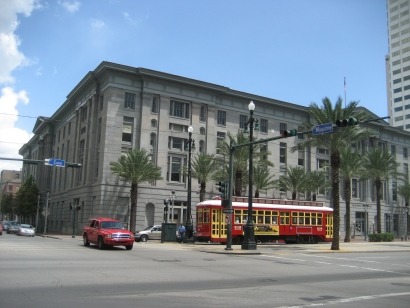
Through an Energy Savings Performance Contract (ESPC), GSA will upgrade building infrastructure and install new technologies that will reduce energy consumption and costs at four federal buildings in the Dallas area and six in Louisiana. The contract was awarded to Ameresco and the investments are estimated to save about $1.4 million per year at today's energy prices and reduce emissions by about 6,000 metric tons per year.
This project is one of many supported by the Inflation Reduction Act - which provided $3.4 billion to GSA for emerging and sustainable technologies, low-embodied carbon materials, and other measures to improve the sustainability of the federal footprint.
Two of the buildings - Cabell and the New Orleans Custom House - will undergo "deep energy retrofits," meaning at least a 40% reduction in emissions. At Cabell, one of the largest consumers of energy among federal buildings in the region, the project will reduce energy consumption by an estimated 49%, supported by magnetic levitation chillers, building automation improvements, and high-efficiency transformers.
Examples of other major upgrades in the 10 buildings include chiller replacements with cleaner refrigerants at the Terminal Annex Federal Building in Dallas and the Hale Boggs Federal Building and Courthouse in New Orleans.
These efforts will help GSA continue to drive toward the Administration's goal to achieve a net-zero emissions buildings portfolio by 2045, reducing emissions from GSA's building portfolio and improving air quality.
"These investments are a prime example of how President Biden's Investing in America agenda is a triple-win: we're creating good jobs, saving taxpayer dollars through energy efficiency, and ensuring a healthier, brighter future for our communities and our kids," said Carnahan.
"We look forward to working with industry and other stakeholders as we maximize the impact of these investments for the benefit of communities in Texas and Louisiana."
"Here in Texas, our reliance on fossil fuels and our outdated, inefficient power grid has landed us in an energy crisis. Every year, one winter storm or heatwave leads to weeks of power outages and blackouts. Just this month, the Public Utility Commission of Texas acknowledged that data for this year shows demand for power this summer is expected to outweigh supply," said U.S. Rep. Jasmine Crockett.
"This investment in energy efficient and renewable infrastructure in Dallas from the Biden Administration couldn't come at a better time, and I hope to see the improvements made at Earle Cabell Federal Building and Courthouse, Terminal Annex Federal Building, and more serve as a blueprint for how we can modernize our existing infrastructure to meet the needs of tomorrow."
"It is an honor to have been selected to work on this critical project with GSA. It will improve facility infrastructure and ensure energy needs are met at federal buildings across two states while furthering the Administration's 2045 goal," said Nicole Bulgarino, Executive Vice President at Ameresco, Inc.
"Partnerships such as this further demonstrate the leadership and progress of the federal government to strengthen and encourage the clean energy transition."
GSA estimates that the $3.4 billion it will invest through the Inflation Reduction Act will create over 9,500 average annual jobs nationwide for the duration of the projects, support $2.8 billion in labor income, and generate nearly $1 billion in tax revenue for federal, state and local governments. In total, Inflation Reduction Act investments from GSA are expected to avoid more than 2.5 million metric tons of emissions and save $720 million in cost avoidance over the next two decades.
President Biden has charged the federal government to lead by example by sustainably managing its footprint of over 300,000 buildings, over 600,000 vehicles, and $650 billion spent annually on goods and services. On Dec. 8, 2021, President Biden signed Executive Order 14057 and issued his Federal Sustainability Plan, which directs the federal government to achieve net zero emissions operations by 2050 by transitioning federal infrastructure to zero-emission vehicles and energy efficient buildings, powered by carbon pollution-free electricity.

